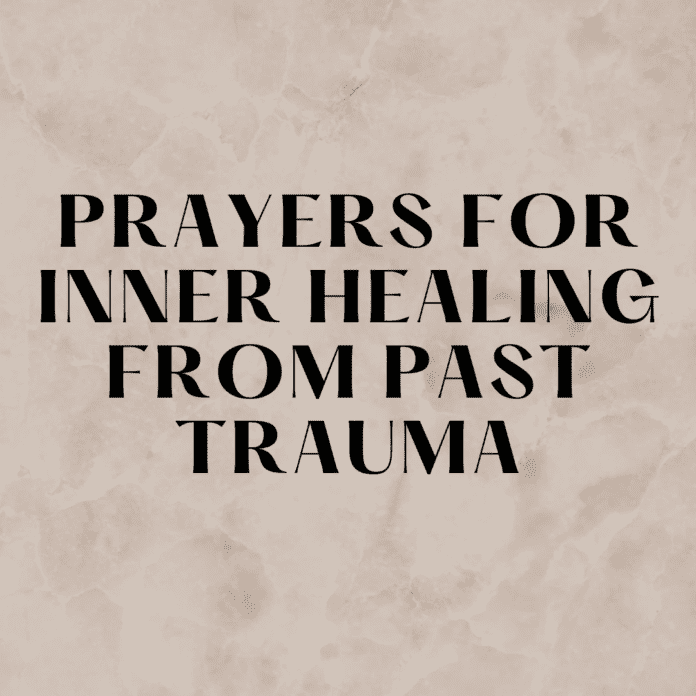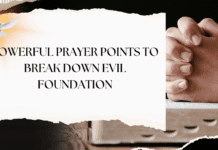Today we will be dealing with Prayers for Inner Healing from Past Trauma. If you have experienced trauma in your life, you may find it difficult to move forward and heal from the pain. Trauma can leave deep emotional wounds that can affect your mental health and overall well-being. However, there are ways to address these wounds and find inner healing. One such way is through prayers for inner healing.

Prayers for inner healing from past trauma can be a powerful tool in your healing journey. These prayers can help you connect with God and find comfort and peace in the midst of your pain. They can also help you release negative emotions and thoughts that may be holding you back from moving forward. Whether you are struggling with anxiety, depression, or other symptoms related to trauma, prayers for inner healing can be a valuable resource.
By turning to prayers for inner healing, you are acknowledging that you cannot heal on your own and that you need help from God. This can be a humbling experience, but it can also be empowering. By surrendering your pain and trauma to God, you are taking the first step towards healing and finding peace. In the following article, we will explore different prayers and practices that can help you find inner healing from past trauma.
Understanding Trauma and Its Impact

Trauma is a psychological response to a distressing event or experience that overwhelms an individual’s ability to cope. It can be caused by various types of events, including physical or sexual abuse, neglect, accidents, natural disasters, or war. Trauma can have long-lasting effects on an individual’s mental and physical health.
Types of Trauma
There are different types of trauma, including acute trauma, chronic trauma, and complex trauma. Acute trauma is a single event that is unexpected and overwhelming, such as a car accident or a natural disaster. Chronic trauma is experienced over a prolonged period, such as ongoing physical or emotional abuse. Complex trauma is a combination of both acute and chronic trauma, often caused by multiple events or experiences.
The Psychology of Trauma
Trauma can have a significant impact on an individual’s psychological well-being. It can cause feelings of helplessness, fear, and anxiety, as well as a loss of trust in oneself and others. Trauma can also lead to the development of mental health disorders, such as post-traumatic stress disorder (PTSD), depression, and anxiety disorders.
Long-Term Effects of Trauma
The long-term effects of trauma can be severe and can impact an individual’s physical and mental health, relationships, and overall quality of life. Some of the long-term effects of trauma include chronic pain, substance abuse, self-harm, and suicidal ideation. It is essential to seek help and support in managing the effects of trauma to prevent further harm and promote healing.
In conclusion, understanding trauma and its impact is crucial in providing effective support and healing for individuals who have experienced trauma. By recognizing the different types of trauma, the psychology of trauma, and the long-term effects of trauma, we can provide compassionate care and support for those who need it.
Principles of Inner Healing

When it comes to inner healing, there are certain principles that can help guide you on your journey towards healing from past trauma. Here are two key principles that can be helpful:
Acceptance and Acknowledgment
The first step towards inner healing is to accept and acknowledge the pain and trauma that you have experienced. This can be difficult, as it requires you to confront painful memories and emotions. However, it is an essential step towards healing.
One way to practice acceptance and acknowledgment is to journal about your experiences. Write down your thoughts and feelings about the trauma you have experienced. This can help you process your emotions and gain a deeper understanding of your experiences.
Forgiveness and Letting Go
Another important principle of inner healing is forgiveness and letting go. Holding onto anger, resentment, and bitterness can keep you stuck in the past and prevent you from moving forward.
Forgiveness does not mean that you are condoning what happened to you or that you are excusing the actions of the person who hurt you. Instead, forgiveness is about releasing yourself from the burden of anger and resentment.
One way to practice forgiveness and letting go is to write a letter to the person who hurt you, even if you never intend to send it. Write down everything you want to say to them, including how their actions have hurt you and how you feel about what happened. This can be a powerful way to release pent-up emotions and find closure.
In conclusion, acceptance and acknowledgment, as well as forgiveness and letting go, are two key principles of inner healing that can help you on your journey towards healing from past trauma.
Spiritual Practices for Healing

If you are looking for ways to heal from past trauma, incorporating spiritual practices into your daily routine can be a powerful tool. Here are a few practices that can help you on your healing journey:
Meditative Prayers
Meditative prayers can help you connect with your inner self and find peace in the present moment. You can try sitting in silence and focusing on your breath, or reciting a prayer that resonates with you. Some examples of meditative prayers include the Serenity Prayer, the Prayer of St. Francis, and the Jesus Prayer.
Scriptural Affirmations
Scriptural affirmations can help you reframe negative thoughts and beliefs into positive ones. You can choose a scripture passage that speaks to you and recite it daily as a reminder of your worth and value. Some examples of scriptural affirmations include Psalm 139:14 (“I praise you because I am fearfully and wonderfully made”) and Romans 8:38-39 (“For I am convinced that neither death nor life, neither angels nor demons, neither the present nor the future, nor any powers, neither height nor depth, nor anything else in all creation, will be able to separate us from the love of God that is in Christ Jesus our Lord”).
Community Worship and Support
Community worship and support can provide a sense of belonging and connection, which can be especially healing for those who have experienced trauma. You can try attending a church service, joining a small group, or seeking out a support group for survivors of trauma. Being in community with others who share your experiences can help you feel less alone and provide a space for healing and growth.
Professional Approaches to Inner Healing

Therapeutic Interventions
Therapeutic interventions are an effective way to address past trauma and promote inner healing. These interventions are typically provided by licensed mental health professionals who are trained to help individuals process and cope with their emotions and experiences. Some common therapeutic interventions for addressing trauma include:
- Cognitive Behavioral Therapy (CBT): CBT is a type of therapy that focuses on changing negative thought patterns and behaviors. This therapy can be particularly helpful for individuals who struggle with anxiety and depression as a result of past trauma.
- Eye Movement Desensitization and Reprocessing (EMDR): EMDR is a therapy that involves recalling traumatic memories while engaging in specific eye movements. This therapy has been shown to be effective in reducing the intensity of traumatic memories and promoting emotional healing.
- Dialectical Behavior Therapy (DBT): DBT is a type of therapy that focuses on teaching individuals skills to regulate their emotions and improve their relationships with others. This therapy can be particularly helpful for individuals who struggle with self-harm or suicidal thoughts as a result of past trauma.
Integrating Spirituality and Therapy
Integrating spirituality and therapy can also be an effective approach to promoting inner healing. This approach recognizes that spirituality can play a significant role in an individual’s healing journey and incorporates spiritual practices into the therapeutic process. Some common ways that spirituality can be integrated into therapy include:
- Mindfulness practices: Mindfulness practices, such as meditation and deep breathing, can help individuals become more aware of their thoughts and emotions. This can be particularly helpful for individuals who struggle with anxiety and depression as a result of past trauma.
- Prayer and meditation: Prayer and meditation can help individuals connect with a higher power and find meaning in their experiences. This can be particularly helpful for individuals who struggle with feelings of hopelessness and despair as a result of past trauma.
Overall, professional approaches to inner healing can be a valuable resource for individuals who have experienced past trauma. By working with a licensed mental health professional and integrating spirituality into the therapeutic process, individuals can find healing and hope for the future.
Personal Journey to Recovery
If you are seeking healing from past trauma, know that you are not alone. It takes time and effort, but it is possible to recover and find inner peace. Here are a few strategies that can help you on your personal journey to recovery.
Daily Routines for Healing
Establishing a daily routine can help you stay on track with your healing journey. Consider incorporating the following practices into your daily routine:
- Meditation and Prayer: Set aside time each day to meditate and pray. This can help you calm your mind and connect with a higher power. Revelation 21:4 He will wipe every tear from their eyes. There will be no more death’ or mourning or crying or pain, for the old order of things has passed away.”
- Journaling: Write down your thoughts and feelings each day. This can help you process your emotions and gain insight into your healing journey.
- Exercise: Engage in physical activity each day, such as walking, running, or yoga. This can help you release tension and boost your mood.
Building Resilience and Hope
Building resilience and hope can help you overcome the challenges you may face on your healing journey. Consider the following strategies:
- Self-Care: Take care of yourself by getting enough rest, eating healthy foods, and engaging in activities that bring you joy.
- Support System: Surround yourself with supportive people, such as family, friends, or a therapist. This can help you feel less alone and provide you with a safe space to share your feelings.
- Positive Affirmations: Practice positive self-talk by repeating affirmations such as “I am worthy” or “I am strong.” This can help you build self-confidence and a positive mindset.
Remember, healing from past trauma is a process that takes time and effort. Be patient with yourself and celebrate each small step forward on your journey to inner peace.
Prayers For Inner Healing From Past Trauma
1. I pray for healing from every painful memory and experience that haunts me, in the name of Jesus Christ.
2. May the scars of my past be transformed into sources of strength and resilience, in the name of Jesus Christ.
3. Grant me the courage to confront my past traumas and the wisdom to learn from them, in the name of Jesus Christ.
4. Heal the brokenness in my heart and mind, restoring me to wholeness and peace, in the name of Jesus Christ.
5. I release forgiveness towards those who have hurt me, freeing myself from bitterness and resentment, in the name of Jesus Christ.
6. Let your divine love wash over me, filling every void left by past hurts, in the name of Jesus Christ.
7. Remove any barriers that hinder my emotional and spiritual healing, granting me a renewed sense of purpose and joy, in the name of Jesus Christ.
8. Heal the wounds that have affected my relationships, restoring trust and harmony, in the name of Jesus Christ.
9. Shield my mind from negative thoughts and memories, filling me with hope and positivity, in the name of Jesus Christ.
10. I surrender my pain and suffering to you, trusting in your healing power, in the name of Jesus Christ.
11. Grant me the strength to break free from cycles of fear and anxiety rooted in past traumas, in the name of Jesus Christ.
12. Fill me with your peace that surpasses all understanding, calming every storm within me, in the name of Jesus Christ.
13. Heal the inner child within me, restoring innocence and joy, in the name of Jesus Christ.
14. Release me from the grip of past traumas, allowing me to live fully in the present moment, in the name of Jesus Christ.
15. I declare that I am a new creation in you, leaving behind the pain of the past, in the name of Jesus Christ.
16. Surround me with supportive and understanding relationships that nurture my healing journey, in the name of Jesus Christ.
17. Break every chain of addiction or unhealthy coping mechanisms resulting from past trauma, in the name of Jesus Christ.
18. Fill me with your Holy Spirit, guiding me towards wholeness and restoration, in the name of Jesus Christ.
19. I renounce any lies or negative beliefs about myself that stem from past traumas, embracing the truth of your love and acceptance, in the name of Jesus Christ.
20. Thank you, Lord, for your ongoing work of healing in my life, transforming me from the inside out, in the name of Jesus Christ.














